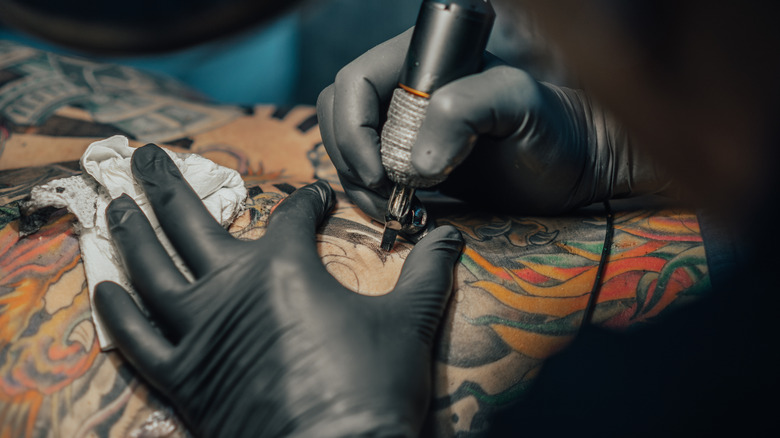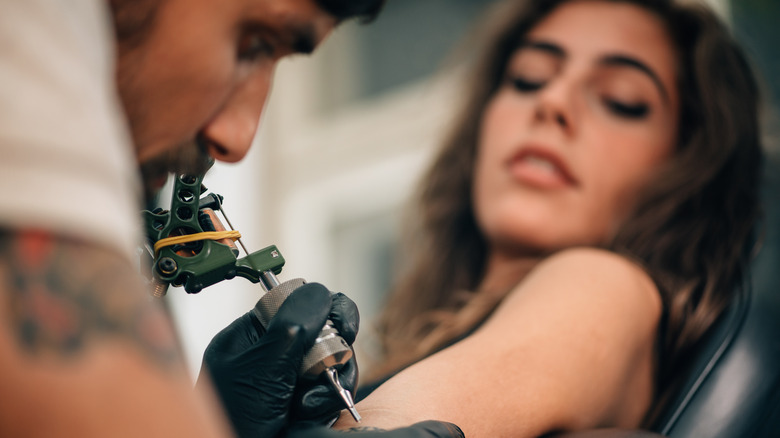Can You Sue An Artist For A Bad Tattoo?
These days, there's truly no limit to who will make the brave decision of getting a tattoo. While the narrative used to be that tattoos were deemed "unprofessional" and held severe enough stereotypes to even prevent someone from getting a job, these days, tattoos have become so normal that they have very little bearing on an outsider's perspective on them. Even Disney, who once completely banned their employees (or cast members) from getting tattoos, has begun to change their notoriously limiting policies and begun to allow for visible tattoos on their workers (via The Guardian).
However, despite everyone and their mom appearing to be totally cool and casual about tattoos, getting one can still be a pretty huge decision. After all,there's lots to consider: what to get, where to get it, how much it'll cost, and so forth. But perhaps something you should make sure to consider are the potential lawsuits that can sometimes arise as a result of a bad tattoo experience.
Neglect and injury from a tattoo artist can lead to a lawsuit
While tattoo artists no doubt want the best for their clients, sometimes appointments don't always go as smoothly as expected. Believe it or not, there are a few pretty common ways that a nasty tattoo experience can lead to an even nastier lawsuit.
Perhaps the most common lawsuits arise if a client has endured any sort of serious pain or injury after their tattoo. That said, tattoos will always be painful to some degree, even if you get a tattoo in the parts of the body that are deemed the least painful, such as the forearm, calves, or outer bicep (via Healthline). Lawsuits from pain/injury can come from a client having an allergic reaction to a pigment or tool used during the tattoo, as well as if the tattoo gun was used incorrectly, resulting in an injury (via Marine Agency Insurance).
You might also be entitled to compensation if your tattoo leads to a serious infection. That said, pain, swelling, and redness can often be conflated with infections, when in reality, they're natural parts of the tattoo healing process (via the American Academy of Dermatology). Infection can also occur due to a client's failure to properly care for their tattoo, which would make the client completely liable, since responsible artists give thorough instructions on tattoo after-care. The only situation in which an artist would be liable for a tattoo-related infection is if your artist was somehow negligent or irresponsible with their work (via Attorney Brian White).
Who decides what constitutes a bad tattoo?
Perhaps one of the biggest deterrents of getting a tattoo comes from the fear that the tattoo will turn out badly — after all, tattoos are permanent and can only be removed through expensive, painful procedures, such as laser-based removal. The short answer is that it is possible to sue an artist for a bad tattoo. The long answer is that there are quite a few elements to consider.
As defining a "bad" tattoo is completely subjective — what one person thinks looks bad might not look bad to another person — it would be difficult to win a case on the basis of not liking the way a tattoo turned out. After all, if the artist copied the exact tattoo you asked them to give you but you simply don't like how it turned out in the end, you more than likely won't have a case on your hands. However, according to Hogan Legal, if you can prove that the tattoo led to any sort of permanent injury or "mental pain and suffering," you might be in luck.
For example, the internet is inundated with photos of misspellings in tattoos. This situation could actually be grounds for a lawsuit, especially if you provided the artist with the proper spelling and they made the mistake.


